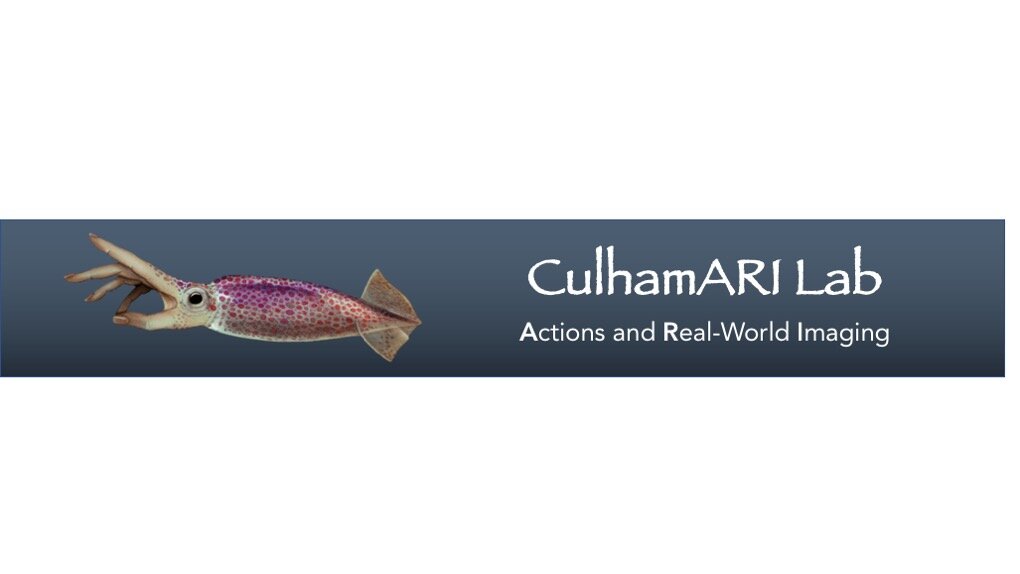Opportunities
Dr. Culham looks to train and mentor promising students and postdoctoral fellows (PDFs), especially those who have previously demonstrated high levels of internal motivation and a passion for research. She devotes much time and energy to mentoring trainees to reach their full potential for careers in academia or industry. Previous lab trainees have been very successful at landing careers in academia (13 of 15 PDFs; 5 grad students), industry, and professional tracks. Dr. Culham welcomes candidates from diverse backgrounds and aims to create a supportive environment that enables individuals to tap into their strengths.
Graduate Students
Students interested in graduate school should consider applying to either the Psychology Graduate Program (deadline ~January for September admission) or the Neuroscience Program (applications accepted throughout the year, though preferred in ~January for September admission). Both Psychology and Neuroscience require a grade of at least 78% or B+ in the final two years of undergraduate studies and an Honours degree (or equivalent). Dr. Culham prefers to take students who apply for a Master’s and intend to proceed to a PhD rather than students interested in a terminal Master’s or students who have done a Master’s degree in another lab (although exceptions will be considered).
Western's graduate programs provide adequate funding through the Western Graduate Research Scholarship, teaching assistantships, and the supervisor's grants. Nevertheless, potential graduate trainees with competitive track records (high grades and/or publications) are encouraged to apply for external funding. Most deadlines are well before the training would commence. Canadians and permanent residents of Canada can apply for Canada graduate scholarships at the Master's level (deadline: December). Canadians, permanent residents and a very small number of international students can get Ontario Graduate Scholarships (deadline: January).
Although Dr. Culham is enthusiastic about recruiting international students, international positions may be limited by the number of international tuition offsets available from the home department.
November 2024 UPDATE: Due to budgetary challenges at Ontario universities, iit is unlikely that I will be able to take on any international graduate students in 2025. Even positions for domestic graduate students are likely to be limited in upcoming years.
Postdoctoral Fellows
Candidates who are eligible to apply for external funding are welcome to contact Dr. Culham by e-mail at jculham<at>uwo.ca to discuss possibilities. Canadians and permanent residents of Canada can apply for NSERC postdoctoral fellowships. Both Canadians and non-Canadians can apply for CIHR postdoctoral fellowships or, if they have outstanding track records and support from the supervisor, prestigious Banting postdoctoral fellowships. At the moment, the lab does not have internal funding for postdoctoral fellows.
November 2024 UPDATE: At the moment, all my grant funds are committed to current trainees and personnel. As such, I can only consider applicants who would be competitive for external funding.
NSERC Summer Students
The lab has a Natural Sciences and Engineering Research Council (NSERC) grant and can sponsor summer students who are eligible for the NSERC Undergraduate Student Research Awards (USRA). The USRA pays students (in addition to top-ups from the advisor's grant) to work on a research project for four months (May-Aug.). Good grades are essential to have a chance at receiving one of these. NSERC requires at least a B average, but in practice, a high A average (high 80s) is more likely to make the cut. For Psychology professors at Western, these applications must be submitted to the Department of Psychology in January to hold an award the following summer. Interested candidates are encouraged to contact Dr. Culham well in advance of the deadlines.
Honours Students, Independent Study Students, and Scholar's Electives Students
Our lab will consider taking students who are interested in conducting behavioral experiments or possibly in working on a subcomponent of a neuroimaging project. We also take students doing independent study projects in Psychology and Scholar's Electives students.
Part-time Undergraduate Assistants
We often have undergraduate assistants in the lab through the Western Work Study Program or as volunteers. Students will typically work with one or more graduate students or postdoctoral fellows to assist with research projects. Though students may start off with simple tasks, we aim to provide opportunities for growth for promising students.
Interested students should send a resume, a recent transcript (unofficial okay), and a statement of interest with an indication of the number of hours/week available. A writing sample can also be helpful.
November 2024 UPDATE: At the moment, the lab has one upcoming Work Study position but no need for additional undergraduate assistance.
Jessica Grahn has an excellent summary of what professors look for in students and volunteers
Brian Scholl has some good advice for undergrads seeking research experience
